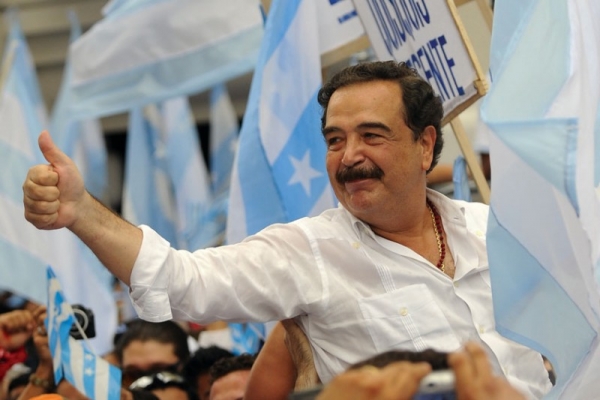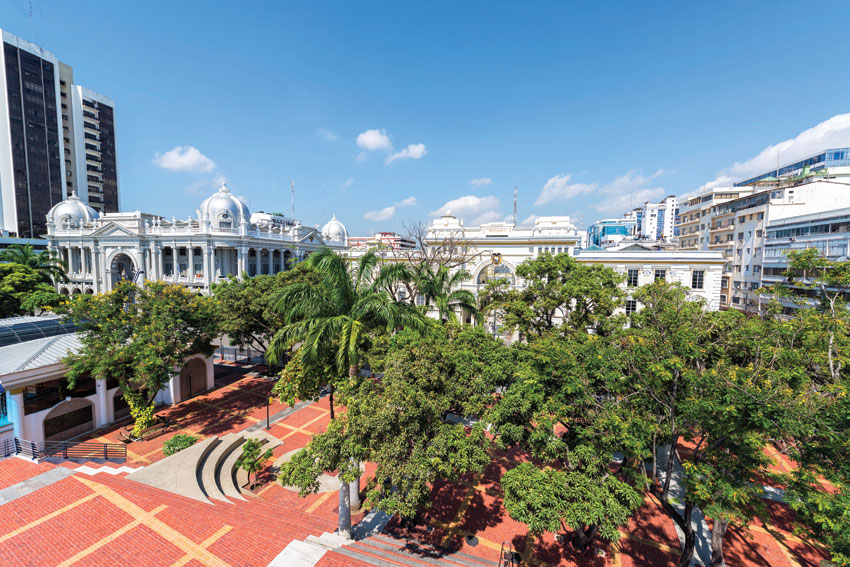Ecuador: Mayor Jaime Nebot has overseen the unprecedented social transformation
2015/12/02

During his 15 years in power, Mayor Jaime Nebot has overseen the unprecedented social transformation, urban regeneration, and economic development of Guayaquil, Ecuador’s most populated city and home to the country’s busiest port. His enduring popularity serves as a testament to the successful realization of his vision of the city as a model for urban renewal
Located in the Guayas province, Guayaquil’s position in the south-western section of Ecuador, by the Guayas River, which flows into the Pacific Ocean, means it is home to one of the busiest ports in Latin America and the Caribbean.
Tourism, business, and agriculture are as well accountable for the city’s residents and companies. Nicknamed “the pearl of the Pacific,” Guayaquil is the major and most populated city in Ecuador, eclipsing even Quito, the country’s capital.
While the city’s vibe is exhaustively modern, Guayaquil has a long history. Founded in 1534, it spent almost 300 years under Spanish control, until the city’s army overthrew the Spanish forces and declared independence the October 9, 1820 before it went on to help other cities declare their independence as well. Guayaquil’s pride in its role continues today, and the city’s flag flies as much as the national flag.
“Guayaquil will at no time give up the right to the freedom to decide, the fairness to receive, or the creativity to evolution,” proclaims the city’s mayor, Jaime Nebot, presently in his 15th year as mayor. He as well points out that the city’s independent attitude does not overrule its commitment to Ecuador; everything his government does aligns with Ecuador’s “national framework”.
Nicolás Romero Sangster, General Manager of the Guayaquil Airport Authority (AAG), describes further the city’s role in later history, “Guayaquil gave birth to [former president of Ecuador] Eloy Alfaro’s liberal revolution and all progressive revolutions. It was from the city that we promoted civil rights, women’s equality and rights to vote, social justice and liberty.”
Economics: Guayaquil’s spirit of independence factors in its entrepreneurial climate.
There is no doubt that the city leads the country in economic indicators, and private-public partnerships and protections for the private sector feature in its economic success. The local authority encourages investment and development, and decisions in business are made quickly.
Mayor Nebot reaffirms, “The national must guarantee access to markets.” All participants in a business venture are up-front. “Here, we respect everyone, and we as well request respect. We are responsible for our successes and our failures.”
The mayor warmly welcomes foreign investment , saying, “We respect and have always respected legal security; we offer clear rules and have a municipality government that promotes and welcomes foreign investment . We are always there willing to help and support prosperous relationships that can lead to the best venture partnerships.”
The city as well benefits from the mayor’s smart foreign negotiations. He has secured financing from the World Bank and the European Central Bank at favorable, competitive rates.
Guayaquil is home to Ecuador’s principal port, which this year was ranked by the Economic Commission for Latin America and the Caribbean as the eighth busiest port in the Caribbean and Latin America. The port accounts for approximately 83% of the country’s non-oil imports.
“It is evident that the long standing history of entrepreneurship is additional alive than ever. Guayaquil is as well positionsing itself strongly in the tourism sector, as a city to be seen, to be enjoyed and to be visited, with award-winning airports, hotels and hidden gastronomy to fall in love with. It as well plays host to world-class international events hosted at the Conference Center ‘Expo Guayaquil’.,” adds Mr. Nebot.
Mayor of Incluvise Growth
Mr. Nebot is in his fourth consecutive term as Guayaquil’s mayor. His long-lasting popularity is testimony to his vision of the city as a model of urban development.
His crusade for betterment began before his mayoral career, at the same time as he was initial governor of the Guayas province. Next leaving the governorship, he was the province’s congressional representative until winning the mayor’s seat in 2000. Throughout his political career, he has worked to continually improve his city, province, and country.
“We respect and have always respected legal security; we offer clear rules and have a municipality government that promotes and welcomes foreign investment . We are always there willing to help and support prosperous relationships that can lead to the best venture partnerships”
And he has succeeded. Since beginning his initial term, the city has seen significant improvements in its water and sewage services, a remarkable success that today has led to nearly 100% coverage within popular neighborhoods making the city a leader in Ecuador. This has been thanks to the work of EMAPAG, the regulator of drinking water and sewage management, and Interagua, a private service provider that has been taking care of the water supply since 2001.
Speaking about the development of the water system, Oscar García Poveda, CEO of Interagua, says, “I think we have taken a giant step, because 12 to 15 years ago, the city had neither this service, nor the coverage, nor the quality. Today, Guayaquil is the Ecuadorian city which entirely ensures drinking water for 100% of the municipality.”
The transport system is an extra significant component of the city that has dramatically improved during Mayor Nebot’s tenure. Guayaquil received its initial rapid-transit bus system in 2006, the Metrovía. It has since become one of the principal and cheapest means of transportation in the city.
An extra feature of Mayor Nebot’s legacy vis-à-vis public transport was the rehabilitation of Terminal Terrestre in 2002, which had been in a national of deterioration for a lot of years. The bus terminal is presently the beating heart of Guayaquil’s public transport system and is used by 25 million people a year. Eduardo Salgado Manzano, General Manager of the Fundación Terminal Terrestre, says that the terminal has had an enormous social and economic impact on Guayaquil since the rehabilitation, which as well included the construction of a mall and food court, making it a popular a vibrant shopping – inclunding transport – hub for the city.
Alongside an improved bus network, the construction of bridges across the Better Guayaquil area has as well been vital to the development of a modern, world-class transport system. The next to be constructed will be 780-metre high bridge across the Daule River, connecting Guayaquil with the town of Samborondon. Costing $83 million, the new bridge will significantly alleviate traffic on the National Unity Bridge located further south and will have access for cars (four lanes), bicycles and pedestrians.
By presently home to the José Joaquín de Olmedo international Airport, which is known for winning international awards in its category thanks to its friendly operations and its customer-centric focus, Guayaquil will as well have a new airport approximately 30 kilometers south of the city to handle the steadily increasing air traffic, as the city attempts to lure additional tourists, particularly from the United States.
The success of Guayaquil’s ground transportation system, the ‘Metrovia’ (a bus rapid transit system), has led to the development of an air travel initiative: the $125 million Aerovía project, a cable-car transport system running at 17 kilometers per hour and 30 meters above the ground, which will have two lines connecting Guayaquil with the neighboring towns of Samborondon and Duran.
Offering breathtaking views of the city and its environs, the Aerovía (which will take two years to complete) is bound to be a hit with tourists.
With well preserved historic buildings, such as the Metropolitan Cathedral, beautiful green spaces, and Malecon 2000, a 2.5-kilometer broad way along the Guayas River, the city has become the top destination for tourists in Ecuador. Mayor Nebot invites travellers to “visit Guayaquil, to observe its evolution, experience its gastronomy, its hotels, its award winning airport”, inclunding to visit the Guayaquil Convention Centre, a 25,000 meters-squared arena which hosts concerts, art exhibitions, business conferences and the annual International Gastronomy equitable.
Guayaquil is as well on the fast track to becoming a smart city, as a result of the Digital City Project, which aims to provide the city with several digital services. The project entails connecting hospitals and clinics, providing e-government solutions and investing in computers, tablets and Internet access for public schools and universities. The plan as well includes the setting up of 6,000 WiFi hotspots across the city.
Over the completed 15 years, Guayaquil has become a much better place for tourists and residents alike. The hard work received recognition on a world scale at the same time as the United Nations designated the city as a model for urban renewal in 2003. Thanks to Mayor Nebot, Guayaquil truly is “the pearl of the Pacific”.
- Related Articles
-
Netanyahu’s Historic Latin American Tour to Highlight Israeli Tech Sector
2017/09/10 Latin America is “hungry for Israeli technology,” a senior Foreign Ministry official said Tuesday ahead of Prime Minister Benjamin Netanyahu’s historic visit to the region next week. Deputy Director General at the Foreign Ministry’s Latin America and Caribbean Division, Modi Ephraim, said the visit will have historic significance, as it will be the initial by a sitting Israeli prime minister. -
PM Netanyahu leaves on historic visit to Latin America
2017/09/10 Israeli Prime Minister Binyamin Netanyahu will leave on Sunday evening for a working visit to Latin America. During his trip, Netanyahu will visit Argentina, Colombia and Mexico. This will be the initial visit by a sitting Israeli Prime Minister to Latin America. Paraguayan President Horacio Cartes will travel to Buenos Aires to meet Netanyahu. Netanyahu leaves for trip to Argentina, Mexico, and Columbia, then meets world leaders at UN General Assembly in New York. Accompanying Netanyahu is a delegation of Israeli businesspeople from the fields of agriculture, water, communications and energy. Members of the delegation will hold commercial meetings with their local counterparts. Eonomic events will as well be held in Argentina and Mexico, led by Netanyahu and the Argentine and Mexican heads of national. -
UNWTO: International tourism – strongest half-year results since 2010
2017/09/09 Destinations worldwide welcomed 598 million international tourists in the initial six months of 2017, some 36 million additional than in the same period of 2016. At 6%, increase was well above the trend of recent years, making the current January-June period the strongest half-year since 2010. Visitor numbers reported by destinations around the world reflect strong request for international travel in the initial half of 2017, according to the new UNWTO World Tourism Barometer. Worldwide, international tourist arrivals (overnight visitors) increased by 6% compared to the same six-month period last year, well above the sustained and consistent trend of 4% or higher increase since 2010. This represents the strongest half-year in seven years. -
Higher earning Why a university degree is worth more in some countries than others
2016/12/11 A university education may expand your mind. It will as well fatten your wallet. Data from the OECD, a club of rich nations, show that graduates can expect far better lifetime earnings than those without a degree. The size of this premium varies. It is greatest in Ireland, which has a high GDP per chief and rising inequality. Since 2000 the unemployment rate for under-35s has swelled to 8% for those with degrees – but to additional than 20% for those without, and nearly 40% for secondary school drop-outs. The country’s wealth presently goes disproportionately to workers with letters next their names. -
Beyond One Belt One Road: a plan for Latin America
2016/12/03 China's president, Xi Jinping, has embarked on a week-long visit to Latin America that will include national visits to Ecuador, Peru and Chile. Mr Xi's trip comes instantly on the heels of a US presidential election that has called the next of US-Latin America relations into question, and highlights China's emergence as a key trade and investment partner for the region.
-
- Ecuador News
-
- ISRAEL: Netanyahu’s Historic Latin American Tour to Highlight Israeli Tech Sector
- ISRAEL: PM Netanyahu leaves on historic visit to Latin America
- AFGHANISTAN: UNWTO: International tourism – strongest half-year results since 2010
- AFGHANISTAN: Higher earning Why a university degree is worth more in some countries than others
- ARGENTINA: China looks to deepen ties with Latin America
- ECUADOR: Guayaquil real estate Big construction projects to substantially improve quality of life
- Trending Articles
-
- SOUTH AFRICA: Nigeria and South Africa emerge from recession
- BAHRAIN: Bahrain issues new rules to encourage fintech growth
- UZBEKISTAN: Former deputy PM named Uzbekistan Airways head
- ARUBA: Director of Tourism Turks and Caicos after Irma: Tourism, visitors, hotels current status
- AUSTRALIA: Western Australia joins two-thirds of country to ban fracking
- ANGOLA: Angola: Elections / 2017 - Provisional Data Point Out Qualified Majority for MPLA












